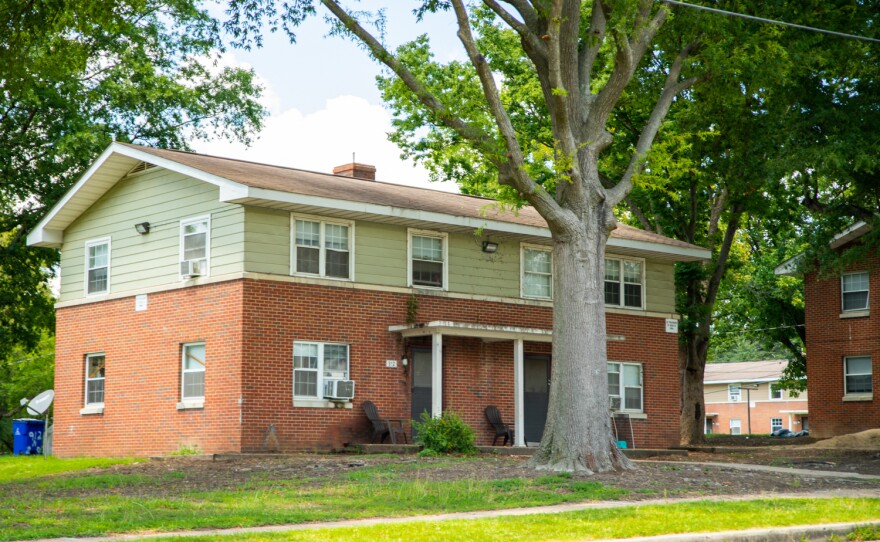The forthcoming eviction of around a thousand public housing residents in Richmond has been temporarily suspended.
On Wednesday, the Richmond Redevelopment and Housing Authority’s Board of Commissioners voted to suspend eviction proceedings until their next meeting on Feb. 16 following public outrage over the planned eviction scheduled to begin in mid-February.
Vice Chairman Barrett Hardiman presented the motion to suspend these lease enforcements and said the housing authority needs to take responsibility for its failure to meet their mission.
“As we approach this deadline that we've set, we're going to have a problem. And we need to reassess our strategy,” Hardiman said. “As a board, we should also take responsibility… We should have reset this strategy. Because we're at a point now where it's really unclear how many families are at risk.”
Hardiman’s motion passed by a 6-1 vote. The no vote came from council member Robley Jones, and members Veronica Blout and Jonathan Coleman abstained from the vote.
As Hardiman said, representatives of the RRHA have fluctuated in their estimates of the number of families who are facing lease enforcements. Originally the housing authority estimated that 900 families would be affected, but at the meeting, RRHA Director of Public Housing Charles Williams said 1,115 families are facing eviction. That means 35% of families living in RRHA-managed properties face eviction, according to RRHA representatives, whose presentation Wednesday identified a total of 3,128 families paying rent in Richmond’s public housing neighborhoods.
According to RRHA’s Interim COO Kenyatta Green, 958 of their families have no income at all, including no financial assistance from the state or federal government. Another 1,282 families survive only on aid from social services. Only 777 families across the housing authority’s neighborhoods have employment.
Board members voted to suspend evictions following a public comment period. All community members present spoke in favor of pausing lease enforcements. Community activists like Brian Bills told the board that especially during a global pandemic and in the middle of winter, evictions would cause serious harm.
“It has been extremely cold outside recently, and I hope we aren’t putting people out onto the streets,” Bills said.
Richmond City Council Member Stephanie Lynch also spoke in support of a pause on lease enforcements during the public comments portion of the meeting. She called RRHA’s plans to evict its residents a crisis.
“I'm here as a friend, as a partner, pleading with you to do all that we can to try and stop on the legal end, stop where we are, halt where we are with these families and with these individuals who are facing eviction,” Lynch said.
Two community leaders and educators presented the board with a petition to pause lease enforcements against school-age children until the end of the school year. That petition had over a thousand signatures and was circulated in part by Richmond Public Schools teacher Beth Almore.
“Let's not be naive and pretend that being evicted will not impact our children's ability to come to school on time ready to learn,” Almore said. “This is how the trauma from eviction shows up in our schools. Students will exhibit dysregulation, which is a fancy word for misbehaving. They will show depression. The little children might exhibit failure to thrive, anxiety, poor physical development, inability to process their emotions, poor social skills.”
Blout said she abstained from the vote due to concerns that delaying eviction proceedings would violate the law. RRHA’s Interim CEO, Stacey Daniels-Fayson, told the board that they can’t choose to forgive debts or to not enforce leases.
“Going forward with lease enforcement is not a choice, but it’s an obligation,” Daniels-Fayson said. “First and foremost, we are landlords. And as landlords it’s important that we are enforcing our lease.”
Under U.S. Department of Housing and Urban Development regulations, public housing landlords must comply with the terms of their lease including following collection procedures for delinquent rents. Their guidance says that affordable housing programs “must aggressively pursue and fully document efforts to collect delinquent rent. Efforts are to have included workout agreements where appropriate, and eviction.”
However, that’s changed since the COVID-19 pandemic began. According to HUD, while the national state of emergency continues to be in effect, the department is requiring landlords to “provide tenants facing eviction for non-payment of rent with additional time and other protections to allow them the opportunity to secure emergency rental assistance that may stave off eviction entirely.”
That means that while they can’t legally forgive their tenants’ debts entirely, RRHA is required to delay eviction proceedings while the state of emergency remains in place.
Before their next meeting and the resumption of eviction proceedings, board members said they intend to get input on the issue from Richmond’s mayor, superintendent of schools and City Council members.
Residents can avoid eviction from RRHA properties by applying for rental relief through the state. To apply for rental relief, you can click this link or call 703-962-1884. To access national resources for avoiding eviction, visit this link.


